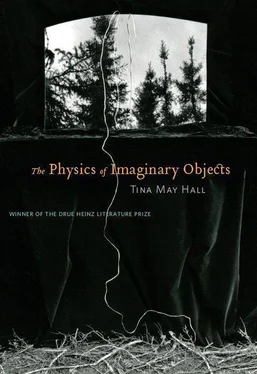Tina Hal - The Physics of Imaginary Objects
Здесь есть возможность читать онлайн «Tina Hal - The Physics of Imaginary Objects» весь текст электронной книги совершенно бесплатно (целиком полную версию без сокращений). В некоторых случаях можно слушать аудио, скачать через торрент в формате fb2 и присутствует краткое содержание. Год выпуска: 2010, Издательство: University of Pittsburgh Press, Жанр: Современная проза, на английском языке. Описание произведения, (предисловие) а так же отзывы посетителей доступны на портале библиотеки ЛибКат.
- Название:The Physics of Imaginary Objects
- Автор:
- Издательство:University of Pittsburgh Press
- Жанр:
- Год:2010
- ISBN:нет данных
- Рейтинг книги:5 / 5. Голосов: 1
-
Избранное:Добавить в избранное
- Отзывы:
-
Ваша оценка:
- 100
- 1
- 2
- 3
- 4
- 5
The Physics of Imaginary Objects: краткое содержание, описание и аннотация
Предлагаем к чтению аннотацию, описание, краткое содержание или предисловие (зависит от того, что написал сам автор книги «The Physics of Imaginary Objects»). Если вы не нашли необходимую информацию о книге — напишите в комментариях, мы постараемся отыскать её.
The Physics of Imaginary Objects,
The Physics of Imaginary Objects — читать онлайн бесплатно полную книгу (весь текст) целиком
Ниже представлен текст книги, разбитый по страницам. Система сохранения места последней прочитанной страницы, позволяет с удобством читать онлайн бесплатно книгу «The Physics of Imaginary Objects», без необходимости каждый раз заново искать на чём Вы остановились. Поставьте закладку, и сможете в любой момент перейти на страницу, на которой закончили чтение.
Интервал:
Закладка:
Tina May Hall
The Physics of Imaginary Objects
To David and Kristy Hall
Visitations
There was a squirrel trapped in the wall behind my stove in October. We could hear it clawing back there, but what to do? “Maybe it will leave of its own accord,” Paul said. We sat at the kitchen table, an old farm table so heavy it took two people to shift it, and listened. Perfect, I thought. One of my friends had come home one night to find her hunter husband had skinned a squirrel and put it in the Crock-Pot. She had lifted the lid expecting rice and beans and had found the pink body curled like a fetus.
One day, I said, “The squirrel's gone — listen, quiet.”
He said, “Or it's dead in there.”
The stench started three days later. Paul had gone to Phoenix for a conference on new soil technologies, leaving me with the changing leaves and the dead squirrel. At first it was just a tang in the air, sweet-sour, like menstrual blood, like the hair under his arms where I liked to bury my nose. Then it turned gamey, thickened. It spread through the house, a smell that gnawed at me like an itch I could never reach. Paul said it was the baby, said pregnant women had an enhanced sense of smell. Only four months in, and already he had read several books on the subject, was after me to start practicing my breathing and do squats to prepare my pelvic floor. He did not understand it was all I could do to shower and do a little work each day. The morning sickness had not let up, despite what his books predicted. It wasn't really nausea, but more like a shaky hunger, a yearning mixed with claustrophobia. The only thing that helped was meat. Roast beef, steak, sliced ham, chicken cutlets. As long as I ate a good helping of meat every few hours, the sickness stayed at bay, a buzz in my throat. I knew it wasn't really the baby's fault, but I felt robbed of my last few months of freedom. Whenever Paul called from sunny Phoenix, bitterness choked me, made him think I was crying. He was perplexed and irritated. He used words like miracle and new life. I opened the windows, and the spiders came in. They clustered in the corners of the high ceilings and masqueraded as cracks in the plaster.
October, four years ago, I was also pregnant. This was before Paul. I was a dating a lumberjack who actually wore plaid shirts and had arms like tree trunks and a sweet quirk in his cheek and a habit of cleaning the snow off my truck. When I went to the doctor because my period wouldn't end, she said, “Did you know you were expecting?” I misheard this as expectant and smiled gamely, in a way I thought might be hopeful-looking, wanting to please. Then she took me to a small sterile room and sent me home with a stack of thick cottony maxi-pads like the ones my mother kept in her bathroom cupboard even though she was menopausal. And I was neither mournful nor guilty. It was as if nothing had happened. If I had any feeling about the event, it was a feeling of mild gratitude, the surprise of a small blessing. One night soon after I told him about it, the lumberjack wouldn't come in from chopping firewood. By morning, he had disappeared into the forest, leaving me enough logs stacked against the house to last the winter.
Paul called from Phoenix to tell me about the palm trees. He said they were everywhere, shaggy spires lining the highways and yards. At the conference, they showed pictures of the newest cell phone towers, sculpted to look like everyday objects so that farmers would agree to install them on their land. Everyone liked the one that looked like a windmill. The next time Paul went out, he noticed that some of the palm trees were metal, their split fronds stiff with the business of transmitting and receiving.
When I was alone in the house, something expanded. I slept sprawled across the bed. I left books piled in the living room and plates in the sink. Sometimes it felt like my heart beat so slowly it stuttered and paused, and I could trace the whole path of a leaf falling outside the window before it started again.
The stench kept getting stronger. I could smell it everywhere, even when I was away from the house, walking in the woods, trying to outpace the morning sickness. Even with the cold autumn air stinging my nose, the smell lingered, crouched at the back of my throat, and no amount of swallowing would get rid of it. “We have to do something,” I said, the next time Paul called.
He said, “Let's wait it out. It won't last forever.”
I met him in a feed store. I was buying tube sand for the back of my truck, and he was checking prices on phosphate. He was a landscape architect starting his own nursery. It was March, and he leaned against the counter, wearing a denim jacket with a dirty sheepskin lining and flirting with the woman ringing up my four bags of tube sand. She must have been eighty years old, and as she ponderously searched out each key on the register and stabbed at it, he said to me, “Isn't a bit late for that?”
He disagreed. He said we met at a wake for a neighbor. I remembered the wake — early spring, the long line of black-clad people strung like beads spilling out of the Victorian house of the mortician — but not him. One of us was forgetting something.
The first snow came while he was still in Phoenix and the dead squirrel was tight in my wall. The small flakes sifted in through the open windows and powdered the hardwood floors. As the snow fell, I felt the baby moving inside me. I hadn't been expecting it for weeks still. Paul had told me that first-time moms often didn't recognize the baby's movements, mistook them for indigestion. It felt like someone tickling me from the inside. I felt bones slipping where there should have been no bones. I went to the stack of pregnancy books on the coffee table and flipped through the pages of the fattest one as if divining from a Bible. My finger stabbed a line drawing of a closed-eyed fetus, its nose tipped up, sniffing, the cord foregrounded, knotted like a sailor's rope. That night, the stars shrank and hardened and the screens in the windows shuddered, punctuating my sleep with aluminum whispers.
My refrigerator was a bloody mess, all that meat rotting imperceptibly. For breakfast, I had half a chicken and I fried a pork chop for a midmorning snack. The baby was hungry for flesh. At the grocery store, I was a werewolf, flinging lamb shanks and ham hocks and rump roasts into the cart. The village ladies giggled and stared at my stomach. The cashier double-bagged everything.
When Paul moved into my house, it was because I refused to spend the night at his. It was a principle of mine to never stay the night at a man's house. And I never had. In all the years of lovers and flings, they always came to me.
I was spending more time in the basement, where the smell was nagging but not unbearable, like a tooth going rotten. The basement was where I had set up my workshop, a grand name for a couple of banquet tables and old file cabinets filled with paints. The knives I kept in a rack on the wall. The handles were black with touch, but the blades shone, oily and flexible. I used linoleum blocks for my woodcuts, and in the cold weather I wrapped them in a heating pad to rid them of their stiffness. Magazines bought these illustrations more often than one might think — duck hunting at dawn, lost in the woods, the persistent mayfly, bear attack.
One morning, soon after the first snow, a bird tried to get into the house. I was coming upstairs from the basement, and the full stench of the squirrel hit me before I heard the thumps. For a moment, my heart jumped — I thought the squirrel had come alive and was trying to escape. Then I went into the kitchen where the smell was most dense and I saw the bird, a small brownish-gray one, maybe a sparrow or a wren, hurling itself at the window. Finally, it stopped, and I went outside to look for its body, but nothing was there, just a few feathers on the ground and a tear in the screen.
Читать дальшеИнтервал:
Закладка:
Похожие книги на «The Physics of Imaginary Objects»
Представляем Вашему вниманию похожие книги на «The Physics of Imaginary Objects» списком для выбора. Мы отобрали схожую по названию и смыслу литературу в надежде предоставить читателям больше вариантов отыскать новые, интересные, ещё непрочитанные произведения.
Обсуждение, отзывы о книге «The Physics of Imaginary Objects» и просто собственные мнения читателей. Оставьте ваши комментарии, напишите, что Вы думаете о произведении, его смысле или главных героях. Укажите что конкретно понравилось, а что нет, и почему Вы так считаете.












